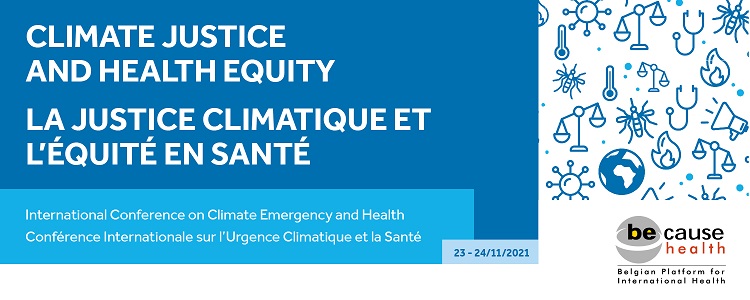
International conference on Climate Emergency and Health
Online, 23 and 24 November 2021
REGISTRATION CLOSED.
INTRODUCTION
While the world struggles with the COVID-19 pandemic, the accelerating health crisis, induced by the climate emergency, requires our even more urgent attention. No community – much more so for a poor than a rich – is immune from the health impacts of climate change. People around the world face increasing extremes of heat, food and water insecurity, and changing patterns of infectious and chronic diseases. Unless urgent action is taken, the health impacts of the climate emergency will bring further disruption, threaten lives and livelihoods and compromise the health systems we depend on.
The COVID-19 pandemic and climate emergency represent converging crises. At the same time, climate emergency and epidemiological changes share common drivers. It is imperative that these emergencies are addressed in a comprehensive manner, while acknowledging public health needs, inequalities and historic injustices.
Be-cause health – the Belgian platform for International health – is a pluralistic and open platform. Our annual conferences connect Belgian and international health professionals, researchers and policy advisors to exchange latest research findings and field experiences and draw policy oriented lessons.
The 2021 annual conference, entitled ‘Climate Justice and Health Equity’, aims to look into the interlinkages between climate change and disease trends and underlying causes , with a focus on public health impacts in LMICs, and will explore possibilities to mitigate and adapt to the pending emergency. It will look in detail to the pathways and interrelations through which the climate emergency may impact health outcomes.
The conference will discuss how global health organisations and health workers address the climate emergency in their health activities and programmes. Moreover, participants learn and exchange on how transformation could be enabled given that an urgent shift to a circular and socially just economic system, that respects the planetary boundaries, is required.
Participant contributions from their different fields of experience and disciplines will take advantage of recent advances in climate sciences, technologies and services as well as lessons learnt from communities affected by extreme weather events and climate variations. Also, we are witnessing improved capacities in risk forecasting, warning and management. This is a window of opportunity for the health sector to adjust its universal coverage strategies as climate emergencies affect at most the vulnerable population groups.
The following main questions will guide the conference:
- How does the climate emergency impact public health outcomes?
- How could health stakeholders and health systems adapt to and mitigate ecological change?
- How to develop resilient health systems in Low-and Middle Income countries?
- What are the priorities in the field of health to transform to a circular and socially just economic system, that respects the planetary boundaries?
- What would be the role of health and development organisations in contributing to such a transformation?
The conference is not an end, but a starting point and will lead to the creation of a Be-cause health working group on Climate Justice and Health Equity. The working group will take forward the key outcomes of the conference and will develop a range of activities that will focus on the climate emergency, transformation and how global health stakeholders could contribute to this.
Simultaneous interpretation between English and French will be provided.
A taskforce of Be-cause health members has, on a voluntary basis, supported the set-up of the programme and the practical organisation. A scientific committee has, also on a voluntary basis, reviewed the abstracts and selected the speakers presenting at this conference. The platform diversity is well represented within the taskforce and the scientific committee.
The supporting partners of the conference are the Institute of Tropical Medicine (ITM) in Antwerp that hosts our platform and facilitates the organisation of this conference and the Belgian Ministry of Foreign Affairs / DG Development Cooperation.

